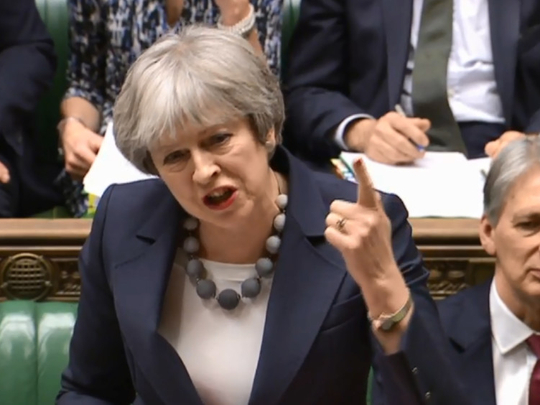
In all the noise surrounding this week’s Cabinet reshuffle in the United Kingdom, one sound in particular has been unmistakable: That of rising Tory angst about the party’s future. It might be strange to witness such self-doubt at the moment when Britain’s departure from the European Union (EU) looks set to realise so many Conservative dreams. But Brexit is perhaps one of those classic pyrrhic victories that cheers the troops while sowing the seeds of a seismic defeat that may lie just around the corner.
Yes, it is quite something that the Tories are still neck and neck with Labour in the polls, and they could still win the next election. But their position nonetheless suggests encroaching twilight, for reasons that run much deeper than the prime minister’s shortcomings, the fact that she is now on to her third work-and-pensions secretary in 18 months, or the way Jeremy Hunt’s howling failures have been rewarded with even more responsibility.
The evidence is plain. At the general election, Labour was hugely ahead in all age categories under 40. The fact that the polarities were completely reversed among the over-50s heralded a new politics deeply divided along generational lines, with the Tories seemingly on the wrong side of history. Six months on, the spectacle of Conservative politicians now believing that their revival might lie in pirouettes over foxhunting or a new drive on “school standards” compounds the sense of a force nominally in power but all at sea.
A question: Do the Tories meaningfully exist any more beyond Westminster and the closed circles of power and influence highlighted by the Toby Young fiasco? Corporate donations and hired help might just about get them through election campaigns. But while Jeremy Corbyn’s Labour Party can justifiably claim to be a mass movement, the Conservatives have not released any membership figures since 2013, and are reckoned to have as few as 70,000 members. According to recent polling, 71 per cent of Conservative members are men and 44 per cent are 65 or more. More than half of card-carrying Tories still support the death penalty; three-quarters agree that “young people don’t have enough respect for traditional British values”. The grass roots may have liked Priti Patel’s claim this week that they are “the beating heart of our movement”, but that may well be part of the problem.
Whatever form Conservatism takes, many will see in it a fundamental set of hypocrisies and delusions, and the combination of needless austerity and the lunacy of Brexit may curse the Tory party for a very long time. In the long run, it will be further tested by huge changes to technology, work, and the age balance of the population that are demanding new thinking from all sides. But even so: it surely ought to be doing better than it is.
What of such neglected or abandoned ideas as the “big society” and the northern powerhouse? Conservative leaders could set store by the basic ideals of the market but also be keenly aware of its failures. They could take the bold step of actually building some social housing; they could call out monopolistic train and energy companies and banks in the name of genuine capitalism. Someone at Central Office ought to reread the conservative philosopher Michael Oakeshott: “To be conservative ... is to prefer the familiar to the unknown, to prefer the tried to the untried, fact to mystery ... present laughter to utopian bliss.”
This kind of Conservatism would have avoided Brexit like the plague. Still, combine its essential disposition with the David Cameron-John Osborne era’s modernism, and you might have the start of something. In Scotland, this combination seems to form the essential philosophy of the Tory leader, Ruth Davidson. Meanwhile, in England, Toryism seems to have been commandeered by a coalition of freaks and throwbacks sitting atop a political machine that is sputtering to a halt. So it is, perhaps, that once-great political empires slowly turn to dust.
— Guardian News & Media Ltd
John Harris is a Guardian columnist.










